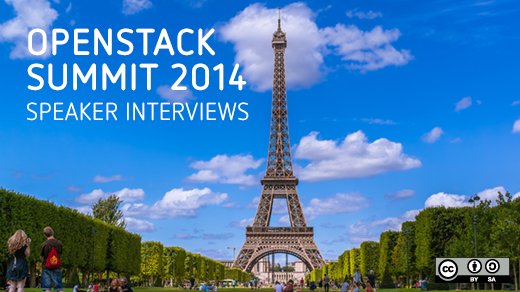OpenStack has presented a huge opportunity for technologists at many levels. Niki Acosta is one of those technologists who strives to pull together all aspects of the OpenStack community for the betterment of everyone.
Niki is the Director of Cloud Evangelism at Metacloud, now a part of Cisco. Metacloud delivers private infrastructure as a service based on the popular and open source cloud platform, OpenStack. As an active OpenStack participant, tweeter, and blogger, she has become a recognized name in the cloud industry.
Find out more in my interview with Nikki.

So, let's start easy. What does an OpenStack/Product Evangelist do?
That's a really great question! In short, my job is to educate and engage with folks about OpenStac and the private cloud as a service platform that Metacloud delivers, that is based on OpenStack. Organizationally, I like to think of myself as sitting in between the product, sales, and marketing teams. Functionally, you can think of an evangelist as a super-social subject matter expert who has passion for educating, engaging, and building relationships via social media and in real life. I spend a lot of time at conferences and events. I think of myself as sort of a cheerleader for OpenStack and Metacloud.
How did you get started with OpenStack?
My tech career began at Rackspace just before they were entering the market with a public cloud. I became a "Cloud Specialist" which was sort of a sales engineer for public cloud. I joined the team that founded, and then later open sourced OpenStack. Around the time that OpenStack spun out into a foundation, I wrote my own job description for "OpenStack/Private Cloud Evangelist" and I haven't looked back. It's really amazing to see how far OpenStack has come, both in terms of the actual code as well as the participation and growth of the community.
At the Paris Summit, you're doing a Gender Diversity Panel with some very talented women. How did that panel come about? Who are the Women of OpenStack?
The Women of OpenStack group started as an informal sort of meetup during the OpenStack Summits every 6 months, but has since evolved into something far greater. We've gone from having an unconference session in Boston in late 2011, to a few breakfasts and happy hours, to now having larger sponsored events that are a part of the official OpenStack schedule. What I love most about the Women of OpenStack group is that we're not just getting together for wine, cheese, and networking. We've created OpenStack-focused internships for women and worked with the foundation to offer OpenStack Summit Scholarships. A few of us thought it was about time for a panel covering gender diversity, and we were thrilled when we heard it was accepted.
We want OpenStack to be welcoming to other women, and we want more women to participate in OpenStack, and I think it's working. Between the last two Summits, the number of women attendees increased from 7% in Hong Kong to 9% in Atlanta, and I think we all want to see that number higher in the near term. The Gender Diversity Panel came from many of the women who have been helping to drive change in our industry.
As an open source community, how does the OpenStack community culture impact gender diversity?
The OpenStack community culture as a whole is incredibly diverse. The corporate sponsors range from small startups to the largest of enterprises. You have a good mix of business and technical representation from over 140 countries, so it's culturally diverse, too. The OpenStack Foundation has done a great job in promoting a collaborative and respectful environment that is especially welcoming to women.
You're also a frequent speaker on the talent gap in OpenStack. How has it changed over the past two years?
There isn't just an OpenStack talent gap. When I talk to someone who is exploring cloud, it's easy to see who's ready for it and who isn't. You can't just pick up your legacy apps and plop them into cloud and expect to have the same outcome. There's a transformation that needs to happen, and it's both cultural and technical in nature. People are naturally resistant to change and want to do what feels comfortable.
On the other hand, I think most have heard of OpenStack at this point, and there are pockets within companies that are rolling out applications and features faster than ever before. Disney is a great example. Chris Launey, their Director of Cloud Services, said, "If you can give somebody enough fast, they can make their own cheap." Mobile app marketing firm Tapjoy is another great example. They consistently optimize for redundancy, flexibility, and predictability, and they're using OpenStack to do that. Both of these companies were willing to experiment and look at different options, and both have great engineering chops. They both realized that the value isn't in running cloud, it's in using it, and they're both doing a darn fine job in doing so.
Do you have a current favorite OpenStack initiative or project?
I don't have a favorite initiative or project, per se, but it's interesting to see the types of companies now participating in, contributing to, and consuming OpenStack and its various projects. There definitely seems to be some inherent trust in OpenStack when you hear that companies like Disney, Wells Fargo, and Comcast are using it and contributing back. The foundation's Super User publication is doing a great job at sharing user stories.
What are you most excited about in the realm of open source and cloud?
Technology is moving faster than ever before, and while it's painful for some, it's great for humanity. I imagine a future where we can use open source models and the technology we've built with open source software to tackle serious problems—from curing cancer to drastically reducing carbon emissions. Cloud computing is the foundation for self-driving cars, intelligent homes, and a host of applications that make life easier and better in so many ways. We're laying the foundation for a future that looks a lot different than it does now, and we're just scratching the surface of what's possible.
See the full series of OpenStack Kilo Summit speaker interviews.







Comments are closed.